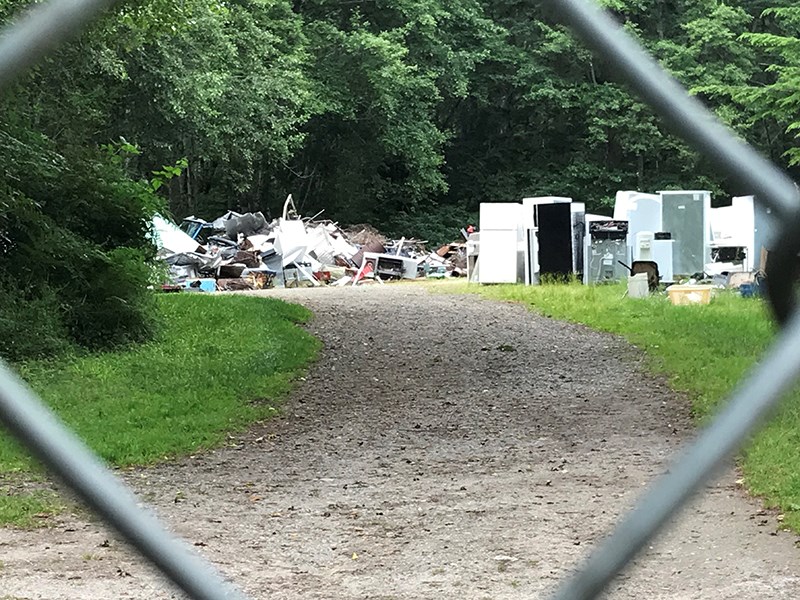qathet Regional District board of directors has voted to not add to existing fencing at the Texada metal transfer station.
At the June 25 board meeting, directors considered motions from the committee of the whole regarding the station, which has served as a walk-in depot for dropping off, recycling and upcycling of metal.
Directors originally considered a motion that the board advise staff to not fence the station in its entirety. Electoral Area D director Sandy McCormick asked if this meant there would be no additional fencing added to the site.
Manager of operational services Patrick Devereaux said staff was not planning on adding fencing but circumstances could change, such as legislation, or problems that arise.
“The plan for the time being is not to add any,” said Devereaux. “Staff would come back to the board if there was a change.”
McCormick said she would like to add into the recommendation that if a subsequent plan is to add to the fencing that staff bring it back to the board for consideration. She then proposed an amendment that the board not add to existing fencing at the Texada metal transfer station.
“The existing wording is ambiguous and leaves the door open to fencing to be added down the road,” said McCormick. “It was very clear to me at committee of the whole that the intent of the discussion was to not add to the existing fencing.”
She added that the people of Texada Island want to continue to have access to this “very valuable” resource.
“I want to be sure that is clear in the wording of the motion so there can be no possible misunderstanding or ambiguity related to this motion,” said McCormick.
City director George Doubt said the motion was making a determination by the board not to fence the entire site. He said his question at the committee of the whole meeting was whether the regional district had received advice from the Municipal Insurance Association (MIA) if they would cover the regional district’s liability if someone was injured because the entire place is not fenced.
“Because we haven’t had that assurance, I’ll be voting against this because I think there is a risk of liability to all of the taxpayers of the regional district, not just a small number, but all of them,” said Doubt.
Devereaux said the site was insured and there is no requirement to fence. He said the fence would provide superior operating status but it was not required.
McCormick said the MIA does not require the site to be fully fenced.
“Clearly, it’s a recommendation, but there is no other source of repurposing materials on Texada,” said McCormick. She added that fencing was not a requirement by WorkSafeBC.
“The people of Texada have spoken,” she said. “A total of 375 out of 385 respondents say they want to continue the usage as is, to be able to repurpose material. Fencing would prevent that from happening.”
Fencing would mean the board turning their backs on the wishes of Texada residents, according to McCormick.
“What’s happening right now is working,” she said.
Electoral Area B director Mark Gisborne said the board had heard loud and clear from Texada residents.
“The ability to reboot, reuse and recycle is an active and engaged process,” said Gisborne. “We should not place barriers that inhibit the community’s ability to participate in that process.”
Gisborne said in the future, he’d like to see a similar idea explored for the resource-recovery centre in Powell River.
As for the Texada metal transfer station, Gisborne said the regional board could be sued if there is no additional fencing added, but it could also potentially be sued by someone trying to climb the fence.
“I’m in favour of not putting up barriers to a community that is trying to be actively engaged in recycling,” said Gisborne.
City director CaroleAnn Leishman said she supported the motion, however, she said a similar process should not be allowed at the resource-recovery centre site because uncontrolled and unauthorized access will not be supported.
“I would caution us not to use this example with the resource-recovery centre,” said Leishman.
The board carried the amended motion for no additional fencing.
At the regional district’s June 11 committee of the whole meeting, directors deliberated on a staff report, which sought direction on whether to put fencing, estimated to cost $30,000, around the facility.
“Fencing is not required,” said McCormick at the committee meeting. “In all of the years of operation I’ve never known of an issue from an injury or anything like that.
“Also, the $30,000 cost for the fencing is part of the waste management budget, so it’s not paid for just by the folks in Area D, it’s paid for by all of you and all your constituents as part of the waste management service.”
McCormick said as it is, the current use of the metal transfer site is to deposit waste metal, including cars, lawnmowers, appliances, bicycles, et cetera. She said it prevents illegal dumping in the forest and keeps the items out of the landfill.
People not only leave items, but pick up items for repurposing, said McCormick.
“It’s an incredibly valuable resource,” she said.
Fencing would further restrict access to the site, said McCormick, against the wishes of people from Texada, who want to maintain current uses.
“Lot six is Texada’s hardware store; if it was fully fenced, access to this valuable community resource would be denied because people couldn’t get in,” said McCormick. “Fencing would punish people who are doing the right thing. That is the wrong message for us to be sending to the public.”



